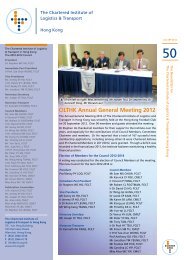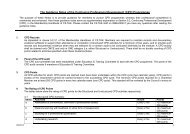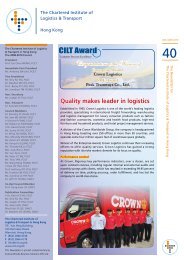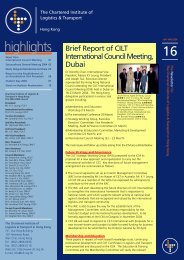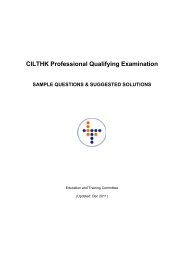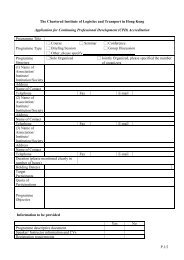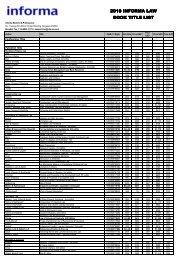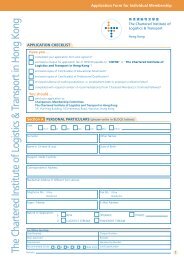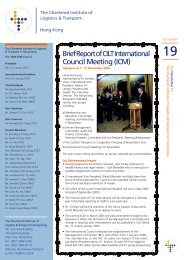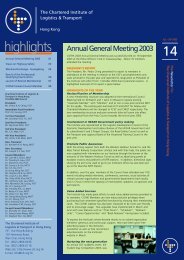CIT WORLD 8 TEMPLATE - The Chartered Institute of Logistics and ...
CIT WORLD 8 TEMPLATE - The Chartered Institute of Logistics and ...
CIT WORLD 8 TEMPLATE - The Chartered Institute of Logistics and ...
You also want an ePaper? Increase the reach of your titles
YUMPU automatically turns print PDFs into web optimized ePapers that Google loves.
CILT Australia is focusing on making a difference in<br />
the logistics <strong>and</strong> transport industry.<br />
Chairman <strong>and</strong> Chief Executive Len Harper outlined<br />
the progress <strong>of</strong> the enterprising effort at the last<br />
International Council meeting in Kuala Lumpur.<br />
“Our primary task is taking a lead role in developing<br />
the industry <strong>and</strong> creating opportunities for the<br />
people to better themselves,” Len Harper said.<br />
Taking an active role in the development <strong>of</strong> policy<br />
issues was a key step towards making a positive<br />
difference.<br />
In this respect, CILT Australia is actively involved in<br />
opportunities to improve public transport <strong>and</strong><br />
funding options in the development <strong>of</strong> a better<br />
public transport system.<br />
<strong>The</strong> group is also part <strong>of</strong> the drive to improve the<br />
effectiveness <strong>of</strong> freight movements in Australia <strong>and</strong><br />
overseas. CILT Australia is represented on the Sea<br />
Freight Council <strong>and</strong> is a partner in the Australian<br />
<strong>Logistics</strong> Council, responsible for a more efficient<br />
freight logistics network.<br />
Education is ‘major consideration’<br />
Education is another major consideration <strong>and</strong> CILT<br />
Australia is represented on the Industry Advisory<br />
Board (NSW). <strong>The</strong> Board is responsible for advising<br />
Government on the opportunities <strong>of</strong> developing<br />
the learning pathways for people in the industry.<br />
CILT Australia has also organized a number <strong>of</strong><br />
Careers Fairs where graduates <strong>and</strong> corporations<br />
come together to discuss the career opportunities<br />
in the logistics <strong>and</strong> transport industry.<br />
Achievements by corporations <strong>and</strong> individuals are<br />
recognized by way <strong>of</strong> the Australian National<br />
Awards Program. <strong>The</strong> program is sponsored by<br />
CILT Australia in partnership with key companies in<br />
the industry. For instance, the major sponsor in<br />
2003 was Mack Trucks.<br />
“CILT Australia is not a group that sits on its h<strong>and</strong>s<br />
<strong>and</strong> waits for things to happen” Len Harper said.<br />
“Our job is to make it happen in partnership with<br />
the primary beneficiaries in the industry.<br />
“That’s what we call making a difference”.<br />
CILTWorld issue 9 07<br />
CILT NEWS<br />
What’s happening in Australia?<br />
ENVIRONMENTAL damage caused by aviation<br />
could be brought under control if aircraft cruised at<br />
a lower altitude <strong>and</strong> flew in straight lines, according<br />
to leading scientists.<br />
Keith Mans, chief executive <strong>of</strong> the Royal<br />
Aeronautical Society, has claimed that pollution<br />
could be controlled even if the industry grows at<br />
the forecast rate <strong>of</strong> 3%-5% a year. “If we invest in<br />
technology, invest in operational improvements<br />
<strong>and</strong> look at the problems in a holistic way, there is a<br />
good chance we will be able to at least stabilise<br />
emissions in the medium term,” said Mr Mans.<br />
New research suggests that by flying 6,000ft lower<br />
than their present cruising altitude, airlines could<br />
cut the damage caused by vapour trails by 47% —<br />
As well as being Chairman <strong>and</strong><br />
Chief Executive <strong>of</strong> CILT<br />
Australia, Len Harper has now<br />
also been appointed a Vice<br />
President. He is pictured with<br />
other senior colleagues at the<br />
International Council Meeting<br />
in Kuala Lumpur. From left to<br />
right: Joe Walsh (Irel<strong>and</strong>), Vice<br />
President; David Maunder (UK),<br />
Vice President <strong>and</strong> Chairman <strong>of</strong><br />
the Africa Support Group; Peter<br />
O’Keefe, President <strong>of</strong> CILT<br />
2003-05; Dorothy Yuen Tak Fai<br />
(Hong Kong), Vice President;<br />
Cyril Bleasdale, Director-<br />
General; Len Harper (Australia);<br />
<strong>and</strong> Dr Ibrahim V<strong>and</strong>u Chikolo<br />
(Nigeria), Vice President.<br />
Low flying 'would aid air quality'<br />
although they would burn 6% more fuel. Vapour<br />
emissions are viewed as a big contributor to global<br />
warming.<br />
Greener by Design, a group <strong>of</strong> academics urging<br />
the aviation industry to take on board<br />
environmental issues, believes that improved air<br />
traffic control could cut emissions by a further 10%<br />
if planes no longer had to fly “zig-zag” patterns<br />
<strong>and</strong> were able to avoid queuing for take-<strong>of</strong>f <strong>and</strong><br />
l<strong>and</strong>ing slots.<br />
<strong>The</strong> findings contradict warnings from the Royal<br />
Commission on Environmental Pollution that<br />
expansion in air travel is unsustainable.<br />
• See reader letter ‘UK airport policy’ page 06.



